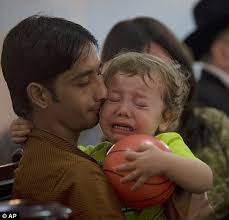
Moshe still thinks of Mumbai as home. The little boy believes his parents live there, and often asks about them. His little world
Moshe revolves around school and play, drawing and colouring, climbing and falling. Terror and bullets don't mean anything to him. Not yet.
Moshe's life appears like that of any normal three-year-old—comfortable, secure and engulfed by love. But behind the surface lies a horrific tragedy that could haunt him as he grows older.
Moshe lost both his parents in the Mumbai attacks last year, as terrorists laid siege to the Chabad-Lubavitch Jewish Centre in a determined attempt to target the community. He had stood crying near his parents' fallen bodies, as terrorists stalked up and down, killing four other Jews in the building.
That Moshe is alive is a miracle, largely engineered by his devoted Indian nanny, Sandra Samuel, who ran to him when she heard his cries, scooped him up and hid in the kitchen until the nightmare was over. For hours they sat wedged between the fridge and the wall. Sandra's bravery became the stuff of legend in the Jewish community from New York to Canberra, sparking a steady stream of fan mail and eulogies. She was given special permission from the Israeli government to accompany Moshe here as the country mourned its dead and adjusted to the idea that its citizens were marked even in India where historically Jews have been welcomed rather than persecuted.
Sandra still takes care of Moshe at his maternal grandparents' home in Afula in northern Israel, a small town near Nazareth. She is Moshe's Indian connection, a real-life link to his parents Gavriel and Rivka Holtzberg, who ran the centre in Mumbai as representatives of the orthodox Chabad movement which seeks to bring alienated and secular Jews back to the fold. Sandra, a recent widow, had grown attached to the family over time, often referring to the couple as 'my rabbi' and 'my Rivka'. Just as the couple had treated their Indian nanny as a family member, she looked after their son as her own, risking her life to save him.
For the Israelis and the larger Jewish community, Moshe and Mumbai will always be synonymous, just as Moshe and Sandra will be for Indians. Mumbaikars want to mark his progress, learn about his favourite food, his playground tricks, his best friends. They feel a responsibility, a connection with the little Jewish boy who was orphaned in the city's collective nightmare. But Moshe's grandparents, who are fiercely protective, adamantly refused permission to Indian journalists to meet either Moshe or Sandra. "It's not good for Moshe. You can't make him crazy," Yehudit Rosenberg, Moshe's grandmother and a former teacher, said sternly over the phone.
A woman of few and firm words, Yehudit described Moshe as a very, very happy boy who did what any child his age would do. "He can be bratty and he can be sweet. He is not too quiet and has connected well to his many cousins." If Moshe is off limits, could one meet Sandra? "No, no. Not now. Very, very busy. Call at 4 pm." And so it went for a week. Yehudit stalled, evaded and insisted that Sandra was very, very pleased to be in Jerusalem and would stay as long as Moshe needed her.
However, Sandra told a local TV channel this week that it was time for her to return home.”My home is India. I belong to India. The kid is quite attached to his grandparents now and I would like to move on," she said. The family keeps her under wraps and allows only well-calculated media appearances aimed at satisfying local curiosity and interest. "I felt a kind of responsibility when Moshe lost his parents, knowing that he was so attached to me. Now he has adjusted to the new surroundings and his family members just adore him," she said on Israeli television. It must have been a long year for Sandra who was transported from a throbbing, cosmopolitan Mumbai and planted in a quiet, religious Israeli town dominated by orthodox Jews.
In a profound irony of life, according to the Hebrew calendar Moshe's third birthday and the first anniversary of his parents' brutal murder fell within a day of each other. He turned three on November 18, on which at sundown began the observance of the death anniversary. Celebrations and mourning came arm in arm for the family. "Sadness has come with happiness," said Yehudit.
A third birthday for an orthodox Jewish boy is very important—he gets his first haircut and begins his formal Jewish education. The family was crazily busy with all the preparations, the birthday party, the various prayers, the memorial dinner for a thousand people. Moshe made an appearance on Wednesday night along with Sandra at a public dinner organised by Chabad near Tel Aviv, looking puzzled at the myriad camera flashes.
The grandparents are trying to find a good balance for Moshe, according to Rabbi Joshua Runyan, a Chabad spokesman and news editor of the Chabad.org website. Leaders of the Chabad movement, who just ended their annual conference in New York, have prepared a Torah scroll handwritten by Jews from around the world to send back to Mumbai after the centre is rebuilt.
The martyrdom of Moshe's parents has rallied worldwide support for the movement. The group's website invites followers to do a mitzvahb or good deed to honour the memory, and thousands of Jews from different countries have made pledges, including a woman who decided to have more babies, while another promised to call lonely souls. More than 200 Jewish babies have already been named after Moshe's parents, according to Runyan. Moshe may live in Afula, protected from the public gaze, but he will always have a large family.
Thursday, November 19, 2009
Moshe's little heart still beats for India
Subscribe to:
Post Comments (Atom)
No comments:
Post a Comment